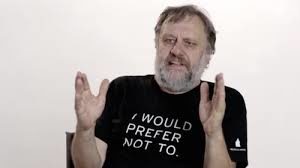Against Public Relations

In the Philosophy Discussion Group we are considering the work of Slavoj Zizek. Zizek is a prolific writer and a popular lecturer. He is a culture critic, a commentator upon contemporary life in these times. His method is dialectical as he comes from a Marxist background.
Zizek often mentions communism, that failed recipe for utopia that went horribly wrong under Stalin. Communism is a term that evokes a knee jerk reaction of revulsion, a reflex of rejection. I am intrigued that Zizek reconsiders communism. He proposes that “communism” can fruitfully be used as a diagnostic term for consideration of the background to our lives. For Zizek communism equals what is common to us all, the problem of the commons. He suggests four elements:
- The commons of Nature as the substance of our life
- The problems of our biogenetic commons
- Our cultural commons (intellectual property)
- The commons as the universal space of humanity
This strikes me as a helpful word; a contemporary acclamation of reality meriting careful consideration.
And this quotation from the Trappist monk, Thomas Merton.
Our thought should be not merely be an answer to what someone else has just said. Or what someone else might have said. Our interior word must be more than an echo of the words of someone else. There is no point to being a moon to somebody else’s sun, still less is there any justification for our being moons of one another, and hence darkness to one another, —not one of us being a true sun.
It may seem that a child begins by answering his parents. That is not true. What is important in the child is his primal utterance, his response to being, his own free cries and signs, his admiration.
It is true that he has to learn a language. Unfortunately in learning to speak, he also learns to answer as expected. Thus he learns more than language: he acquires, with words themselves, a kind of servitude. He gives out words that are asked of him, that evoke a pleasant or approving response. He ceases to acclaim reality and responds to demands, or evades punishment, or engineers consent. He does not merely answer: he conforms or he resists. He is already involved in public relations.
CONJECTURES OF A GUILTY BYSTANDER, the chapter called Truth and Violence: An Interesting Era by Thomas Merton